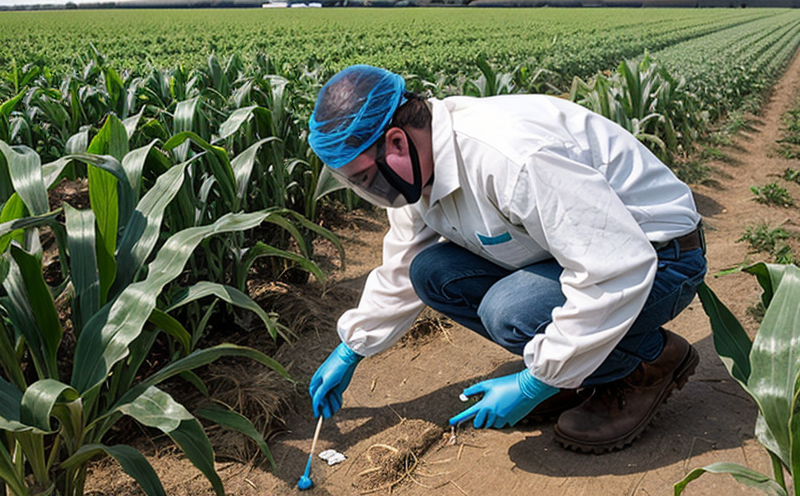Multi-Residue Pesticide Screening by GC-MS
In the realm of agricultural and forestry testing, ensuring food safety and environmental sustainability is paramount. The presence of pesticides in crops can have significant implications for human health and ecological balance. To address this critical need, our laboratory offers a robust service: Multi-Residue Pesticide Screening by GC-MS (Gas Chromatography-Mass Spectrometry).
GC-MS is a powerful analytical technique capable of detecting multiple pesticide residues simultaneously in crops. This method ensures comprehensive screening, providing accurate and reliable results that comply with international standards such as ISO 17025, EN 16438, and ASTM D7289.
The process begins with the collection of representative crop samples from various locations within a field or orchard. These samples are then prepared according to standard protocols, ensuring they represent the true composition of the crop. Post-sample preparation, the extracts undergo several purification steps to remove interfering compounds and concentrate the target analytes.
Once purified, the extracts are injected into the GC-MS system. The gas chromatograph separates the components based on their volatility and polarity, while the mass spectrometer identifies each compound by its unique fragmentation pattern. This tandem approach allows for precise quantification of multiple pesticides simultaneously.
The results of our multi-residue pesticide screening service are presented in a detailed report that includes all detected residues along with their concentrations. Our team of experts ensures that these reports meet the highest standards of accuracy and reliability, providing valuable insights to quality managers, compliance officers, R&D engineers, and procurement professionals.
| Residue Class | Common Pesticides Detected |
|---|---|
| Organophosphates | Diazinon, Malathion, Parathion |
| Pyrethrins | Piperonyl butoxide, Pyrethroids |
| Aryloxyphenoxyacetic acids (AOAAs) | 2,4-Dichlorophenyl, 2,4-Dichloro-6-fluorobenzoic acid |
The benefits of our GC-MS service extend beyond mere detection; it helps in maintaining compliance with regulatory standards and enhancing product quality. By identifying pesticide residues early, stakeholders can take corrective actions to protect both public health and the environment.
Industry Applications
- Agricultural producers seeking to ensure their crops meet international standards for food safety.
- Farmers looking to optimize pesticide application practices through comprehensive residue analysis.
- Retailers and distributors ensuring the integrity of their supply chains by verifying compliance with regulatory requirements.
| Standard | Target Residues |
|---|---|
| ISO 13676:2015 | Pesticides in food of plant origin |
| ASTM D7984-15 | Multiresidue pesticide screening method by gas chromatography/mass spectrometry (GC/MS) |
Our service is crucial for meeting the stringent requirements of international standards, ensuring that agricultural products are safe and compliant with legal limits. This not only protects consumers but also enhances the reputation of producers and distributors.
Customer Impact and Satisfaction
Our clients benefit from our expertise in pesticide residue testing by gaining actionable insights into their operations. By identifying potential issues early, they can implement corrective measures that enhance product quality and protect public health.
We pride ourselves on delivering accurate and timely results, which is essential for maintaining compliance with regulatory bodies such as the European Union's Maximum Residue Levels (MRLs) directive and the U.S. Environmental Protection Agency (EPA).
Customer satisfaction is paramount, and our rigorous quality control measures ensure that every report meets the highest standards of accuracy and reliability. This commitment to excellence has earned us a reputation for providing reliable, high-quality services in agricultural testing.
Environmental and Sustainability Contributions
The use of pesticides can have adverse effects on both human health and the environment. By offering comprehensive multi-residue screening, we contribute to environmental sustainability by helping stakeholders make informed decisions that minimize these impacts.
Our service aids in reducing unnecessary pesticide usage through targeted applications, thereby minimizing runoff into water bodies and soil contamination. This not only supports ecological balance but also promotes long-term agricultural productivity.
By ensuring compliance with international standards, we play a vital role in safeguarding public health while promoting sustainable farming practices. Our contribution to environmental sustainability is further enhanced by our commitment to continuous improvement and innovation in testing methodologies.





